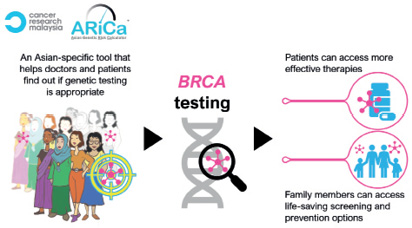In line with this year’s International Women’s Day theme, Break The Bias, Cancer Research Malaysia joined the mission to assist women to make an informed decision about their health through the development of ARiCa – Asian Genetic Risk Calculator.
This new tool allows women who have been diagnosed with breast cancer to see if they are at risk of inheriting a faulty BRCA1 or BRCA2 gene. These tumour suppressor genes help keep breast, ovarian, and other types of cells from growing and dividing too rapidly or in an uncontrolled way.
Statistics show that one out of every 25 patients have a faulty BRCA gene when it comes to breast cancer. Breast cancer patients were previously only offered a test if they were diagnosed at a young age or had close relatives who had breast or ovarian cancer.
However, because age and family history alone does not accurately predict the likelihood of carrying a faulty gene, many gene carriers are not offered the genetic test, missing out on life-saving treatments and prevention strategies for patients and close relatives.
A number of mutation prediction tools have been developed to address this problem, but the majority of them are designed for European women and are less accurate for Asian women.
As a result, Asian patients and their family members miss out on the opportunity of being aware of their genetic risk status, thereby losing the possibility for cancer prevention and accurate treatment selection.
To tackle this challenge, Cancer Research Malaysia collaborated with the University of Cambridge, Universiti Malaya, Subang Jaya Medical Centre, the University of Nottingham, the Genome Institute of Singapore, National University of Singapore, National University Hospital, KK Women’s and Children’s Hospital, Tan Tock Seng Hospital, National Cancer Centre Singapore, Singapore General Hospital, and Changi General Hospital, to analyse BRCA1 and BRCA2 in more than 8,000 breast cancer patients from Malaysia and Singapore.
The results were then used to develop a tool that predicts whether a woman is a faulty BRCA carrier.
Professor Datin Paduka Dr Teo Soo Hwang, OBE, Chief Scientific Officer at Cancer Research Malaysia, who led the study, said: “Using criteria such as age and the presence of a family history of breast cancer, we estimate that each year, nearly 4,000 newly diagnosed breast cancer patients in Malaysia would need genetic counselling and testing, but they often don’t consider a genetic test because most assume that they are unlikely to have inherited a faulty gene.
“With ARiCa, we can now give each woman their likelihood of being a BRCA carrier so that they can be empowered to make informed choices about their health and healthcare practitioners can provide more accurate treatment plans for their patients.”








